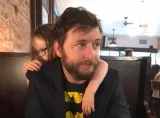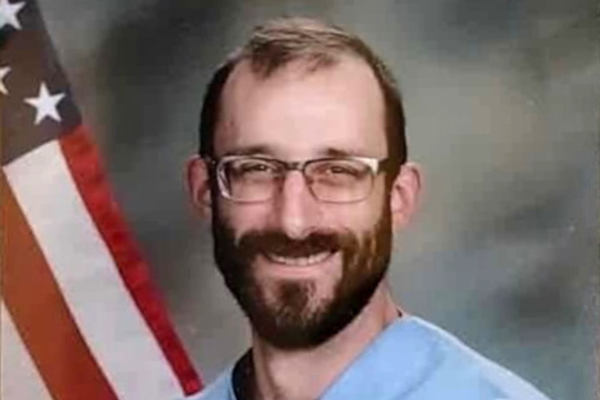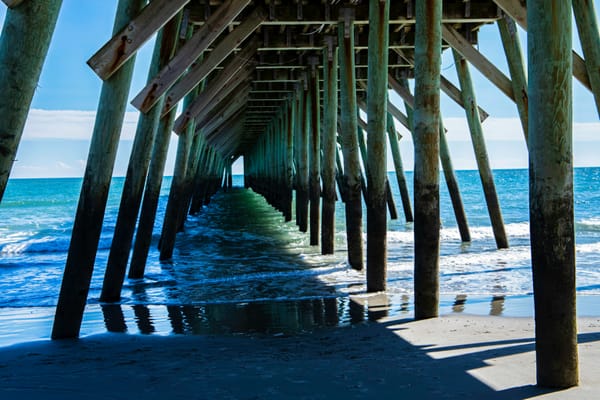This South Carolina pitmaster wants to get barbecue the respect it deserves, finally
In West Columbia, South Carolina, about four miles from where the Saluda and Broad rivers become the Congaree, at the bottom of a cracked and uneven driveway, in a plain white building flying South Carolina's blue-and-white palmetto flag, lies one of the best restaurants in America.
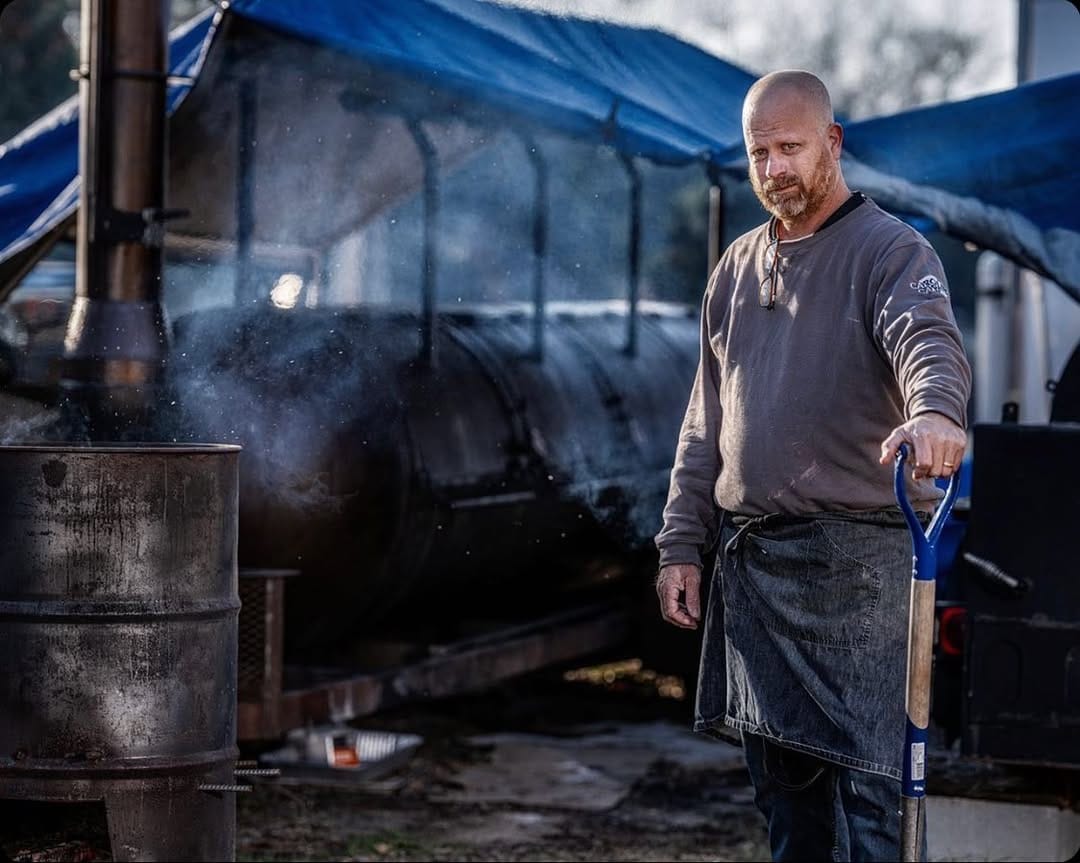
In West Columbia, South Carolina, about four miles from where the Saluda and Broad rivers become the Congaree, at the bottom of a cracked and uneven driveway, in a plain white building flying South Carolina's blue-and-white palmetto flag, lies one of the best restaurants in America.
Though, like most of the best barbecue restaurants in the South, City Limits BBQ looks like a secret. You could drive past it and never know.
"There ain't no damn level floors in this place," says Robbie Robinson, the owner and chef of City Limits. "But it works for us," he says. "And it's a vessel for me to express my barbecue vision."
His vision is being noticed. Since he opened City Limits in 2016, Robinson, a native of nearby Red Bank, has become one of just two barbecue pitmasters to make the semifinals twice for best chef in the James Beard Awards, which, for chefs, is like being nominated for an Oscar.
He's up for best chef a third time this year. The New York Times chose City Limits as one of their 50 favorite restaurants in 2024.
He's a major player in the barbecue world, arguably one of the best pitmasters in America. But like most great barbecue makers, there is an irony to it. Good pitmasters are going for the title. They want to cook the best barbecue on earth and have everyone say so. But they don't want to look like they're trying too hard.
Robinson remembers panicking when his brother called to say he was putting up a "BBQ" sign in front. First, he thought the sign was too nice, the big, black acrylic letters too new. But he accidentally broke one of the letters and the spacing's a bit off so it stayed.
Don't come here for white tablecloths or a neon sign. No one waits in line for an hour to get brisket from a place that looks like a Cheesecake Factory.
It's the paradox of cooking barbecue. It's a dirty, sweaty job, and with folks like Robinson getting these kinds of accolades, it's as primed as ever for the spotlight.
You might cook in a hole in the ground. You smell like smoke and your hands held innards this morning, but your barbecue's so good that it deserves to be plated for the King of England, assuming the King could discern good barbecue from bad. He most definitely can't.
Like this? Buy us a cup of coffee here.
Robinson was a South Carolina kid who wanted to be a fighter pilot. Then, he tried to be an accountant but he was a bad student, so none of the big firms wanted him. He got into insurance and, then, corporate consulting.
His "epiphany", as he puts it, was eating a bad pork barbecue sandwich in Texas, which, admittedly, isn't Texas' thing. The "Texas style" orbits around brisket, ribs, and sausage.
Robinson began experimenting with cooking his own barbecue, and then went out on a limb, selling his food out of a truck when he was about 41 years old. It was either a midlife crisis or a stroke of genius, but it's looking like the latter.
There was, he says, "a hell of a lot of trial and error." But the plaudits have come, and so have the loyal customers.
Today, he cooks pork shoulder over a burn barrel. His brisket has even the Texas die-hards raving. And the pork ribs?
"Hands down, the best ribs in the Carolinas—and maybe even in all of the South," Southern Living wrote in 2024.
"We lit the rocket and it's just been hanging on for dear life ever since," Robinson says.
The fear of the 'bad bite'
In theory, barbecue is rudimentary. At its most basic, the idea is to cook the meat low and slow over wood coals.
It's messy and dirty. It requires no specialized training or degrees. But the best pitmasters are so good, their methods so complicated and, occasionally, mysterious, they can become legends.
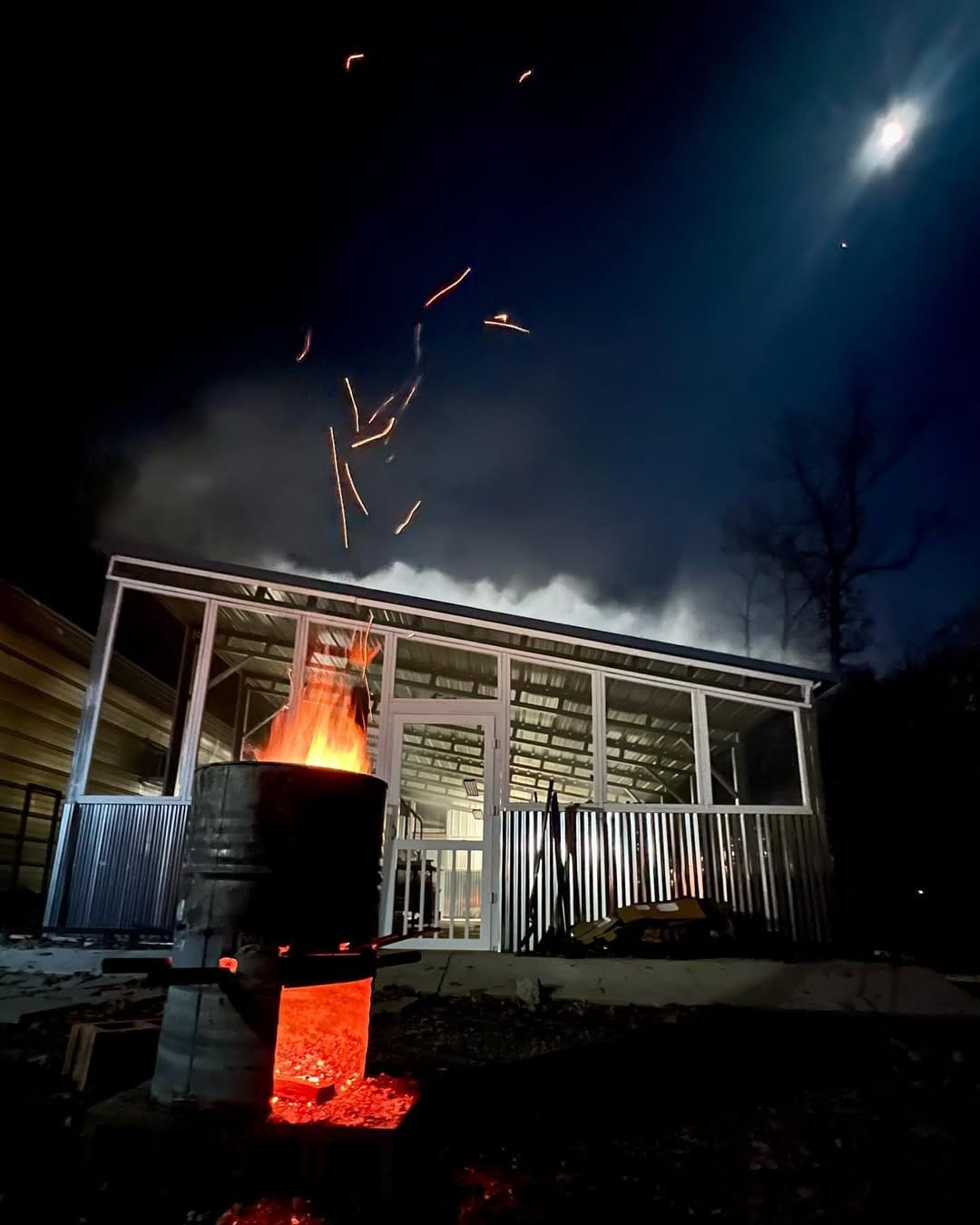
All of this gives the mistaken impression that anyone can do it, but, of course, they can't. It takes taste, passion, and painstaking attention to detail.
Robinson, who speaks in an almost frantic tone, wrestles with the thought of selling someone what he calls, "a bad bite."
Most cultures have barbecue or something like it, but in the American South, it's something to thump your chest over. You can get in trouble in the South for taking the Lord's name in vain, but those same folks might call barbecue a "religion."
Cooking it is a kind of faith though. I cooked a whole hog once in my backyard. It took about 10 hours, but because the market selling me the hog wasn't open the morning of, I had to pick up the pig the night before and store it overnight. You don't keep a dead, 105-pound hog in an ice-filled kiddie pool in your kitchen—bloody hooves up—if you don't believe in something bigger than you.
Like everything else about the South, though, barbecue's legend is part-myth, part-reality. Barbecue's been here before the idea of an American South was even thought of.
The modern idea of barbecue probably originates with Indigenous people in the Caribbean, who used a wooden contraption to cook meat over an open flame, inspiring Spanish explorers to gush about "barbacoa" and the way the smoke settled into the meat.
The barbecue world's also littered with tribal warfare. If you're from here, you don't compliment the barbecue from there, even if it is all, technically, tasty.
In 2024, the comedian Jon Lovett refused to tell an audience in Asheville, NC, where he got his barbecue. He'd been to every BBQ joint in the South, he said, and no matter where he went, people said he went to the wrong place. "The barbecue I eat," he finished, "is between me and f*****g god."
Barbecue's politics too. In 2020, Cal Cunningham, the North Carolina candidate for the US Senate, tweeted a photo in front of a gas grill piled with hot dog and hamburger buns. "There's nothing better than BBQ—except for winning this Senate seat, of course," the tweet read. "Ambassador for North Carolina BBQ" was written on his apron, but NC BBQ is usually pork cooked over wood.
If an alleged affair hadn't doomed Cunningham's campaign, that tweet might have.
'This magical space in between'
In Texas, the main attraction is the beef brisket or the ribs. In eastern North Carolina, the idea is to cook a whole hog and serve it with a smoky vinegar sauce. Go to western North Carolina and you'll barbecue a pork shoulder and serve it with a vinegar-ketchup base.
Robinson, interestingly, floats between two tribes. He began experimenting with barbecue beef ribs in Austin, Texas, while pining for Carolina-style pulled pork, so his restaurant serves both. It's like being a Methodist and a Catholic at the same time.
But it works. That City Limits does it credibly is a testament to his obsessiveness. Everything is handmade. Everything must be smoked this amount of time and salted this way and chopped that way.
"It's not whole hog and it's not pure butt," he told me, "but it's in this magical space in-between."
His dedication to the "one way" is why his restaurant's only open Saturdays and Sundays. This isn't food you pop in the microwave. You tend to it in a smoky barn like a mother would her young.
He could serve more barbecue, make more money, but that would mean cutting corners, he says, and that's something he won't do. It's not self-destructive to hear him put it. It's credible.
"We're not fast food," Robinson says. "We're not just trying to feed you. You can go to Arby's and get a brisket sandwich. That's not what we're trying to serve you. We're trying to serve you an authentically cooked piece of brisket, or beef rib, or handmade sausage."
The Living South Conversation
I spoke to Robinson recently about his restaurant, his method, and why barbecue, however you cook it, is so special.
*The following has been edited for clarity and length.
The Living South:
Robbie, tell me about yourself. Where are you from? And and how'd you get into the barbecue business?
Robinson:
I am from Red Bank, South Carolina, which is next to Lexington, South Carolina, which is just outside of Columbia, South Carolina.
I grew up in, in Lexington, Red Bank, and actually, I grew up wanting to be a pilot. Turns out I didn't get into my preferred school, somehow wound up a journeyman in college from College of Charleston to a local tech to USC and ended up becoming a CPA. And I wasn't particularly a good student, so none of the big firms wanted me.
And got into insurance and met my wife who was living in Austin at the time. Fell in love, got married, and I moved out to Texas for a bit. I had this consulting gig where I worked a lot up in New York, Chicago, Charlotte. It was a 52-week travel job. Experienced a lot of good food from around the country far more than what I'd grown up with here locally and ended up getting a normal job here in Columbia.
We moved back from Texas and rode the corporate train for a bit and decided, I think it's time to do something else. I was eating at a barbecue restaurant. And it dawned on me, and this was about 10 years ago, it was actually August of 2015, I was sitting at this restaurant thinking: 'Why doesn't somebody do a better version of this?'
And at the time, you know, having a normal 9 to 5 job, I'd come home Friday night and watch various cooking shows on Food Network, "BBQ Pitmasters" and Triple D ("Diners, Drive-Ins, and Dives"), and we didn't have any place like those places here locally. Number one, we didn't have any craft barbecue here.
The whole time I lived out in Texas, which was about five years, I never ate any Texas barbecue. Locally here where I'm from, pulled pork is our traditional barbecue, and yellow sauce is, we were originally settled by Germans back in the mid 1700s, and Germans brought the mustard influence here to the Midlands of South Carolina.
So, the whole time I was in Texas, I never had Texas barbecue. I'm a Carolina boy and it just never intrigued me, but I missed my Carolina barbecue or my West Columbia barbecue. And so when we'd go someplace that would have that, I would order the pulled pork and it was terrible.
And I was like, 'Oh, crap, you know, this is, this is not good.' And so, I actually bought my first smoker when I was in Texas. And, like with many things, I said, well, I'm just going to figure out how to do it myself. And started cooking out there. I didn't even realize I had the wrong type of pit at the time.
But I said, well, let, let me look into this. And within a week or two, I think I bought a rack of beef ribs and I had a really piece of junk regular retail vertical smoker, and I cooked these beef ribs. They weren't even the right type of beef ribs of what we cook now.
And I'd never had beef rib before. I had no idea what they tasted like. I knew what they looked like on TV and on the internet. And I took a bite out of that beef rib, which looking back, I figure I got it about 80-85% percent right, and my mind was blown.
I was like, wow, I cannot believe I've never had this before. This is phenomenal. And I don't even know what I'm doing yet. And so that just lit a huge fire to become a student of what I do and consume a tremendous amount of information. There was a hell of a lot of trial and error.
We are truly a Texas barbecue joint, but I always wanted to concurrently or at the same time produce the best Carolina barbecue that I could. So whenever I'm talking to people about the business, it's Texas barbecue, but we also happen to put out some legit Carolina barbecue as well.
And at the same time, all the stuff that I'm doing for these services is almost completely scratch-made.
I'm making the pickles. I'm making the sauces. I'm making the sausages and the bacon that goes into the sides. And then we got a brick and mortar and it was just a rocket. We lit the rocket and it's just been hanging on for dear life ever since.
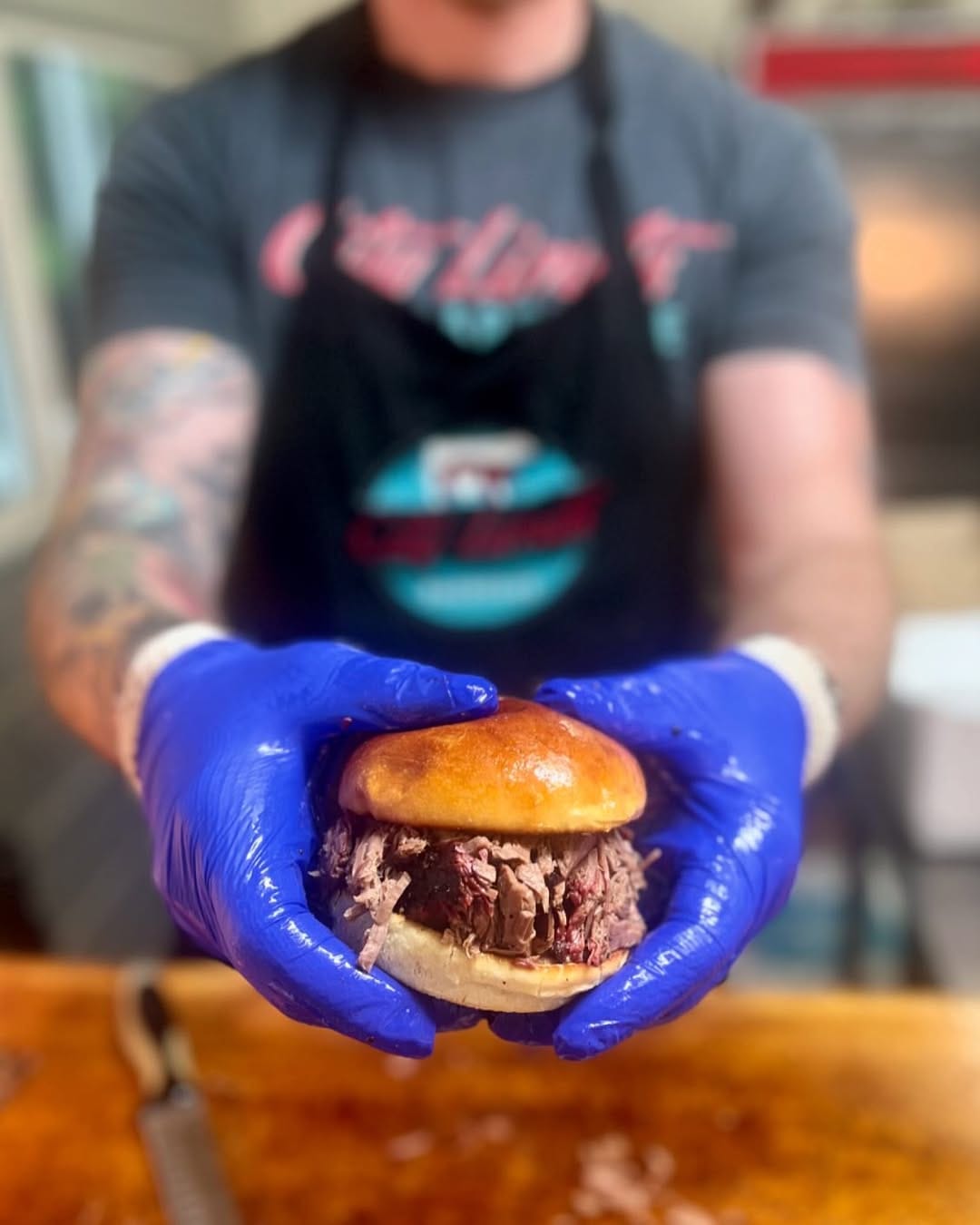
The Living South:
You mentioned you were watching these cooking shows and you've always been interested in cooking.
Where did that interest come from? Was there a family member who taught you?
Robinson:
Like with a lot of kids in my generation, latchkey kids, my parents got divorced when I was, I think, eight or nine, and my dad had custody of me, and, you know, he'd go to work. If I was hungry, well I had to figure out how to feed myself, and so I guess in part it was just a matter of survival.
It wasn't like I was about to starve, but, you know, if I wanted to make a sandwich, I got to make a sandwich myself, my dad's at work. But I do remember around that 8-, 9-, 10-year-old range that there was this little cookbook that I wish I could find. I remember cooking some recipes out of it and, and sometimes they were terrible. I remember cooking a lot of terrible food.
But in high school, I ended up working at a really small local restaurant. And then in college, I started at College of Charleston and worked at restaurants my entire year and a half tenure down there.
And that's where I really learned how to cook.
This was not a dream to open a restaurant, and even 10 years ago, whenever I had this idea, I kept saying to myself—because I'm 51 now, I was 41, 42 when I had this idea—I was telling myself, like, this is not a smart idea. You're not 25 years old anymore, man.
People come to our place because they want to be there.
They're not there getting fast food. They're not there just to get fed. They're there for this experience to engage with the other customers but also to engage with us as we're serving them.
They feed off of that energy and the food service guys that I have are typically guys who would have been in the back of the restaurant, back of the house, not interacting with the customers because you have servers for that. But these guys are up there, they prepared the food. And they take pride in what they've cooked or prepared or prepped.
And the customers, they feed off of that energy while at the same time, my crew, they feed off the customer's energy. And it is just a really awesome dynamic.
I've explained this before, you can have these crazy ideas and envision, you know, how you want this thing. To actually get it to actually happen. I'm like, I cannot believe this is actually happening. It's kind of like how I envisioned this. It's really, really cool.
The Living South:
One of the funny things I've noticed about barbecue and eating barbecue: All the good restaurants are in a building that looks it might be about to fall down. The high-end BBQ restaurants I've been to, they never seem to get it done.
Robinson:
I've had this conversation multiple times with my crew. I've also had this conversation with customers. For us, you're there for the food. You're not there for the cool artwork on the wall. In fact, we only have, like, one, air quote, piece of art on the wall in the entire place.
No money's gone into that. And food cost is important, but that's not what drives what we do. My mission, my goal is to serve you the best bite that I can. Granted I have a dumpy looking, it is a very rough, rustic, barbecue joint and nobody's ever come up and said this does not look like a barbecue joint. Everybody says, this feels like a barbecue joint.
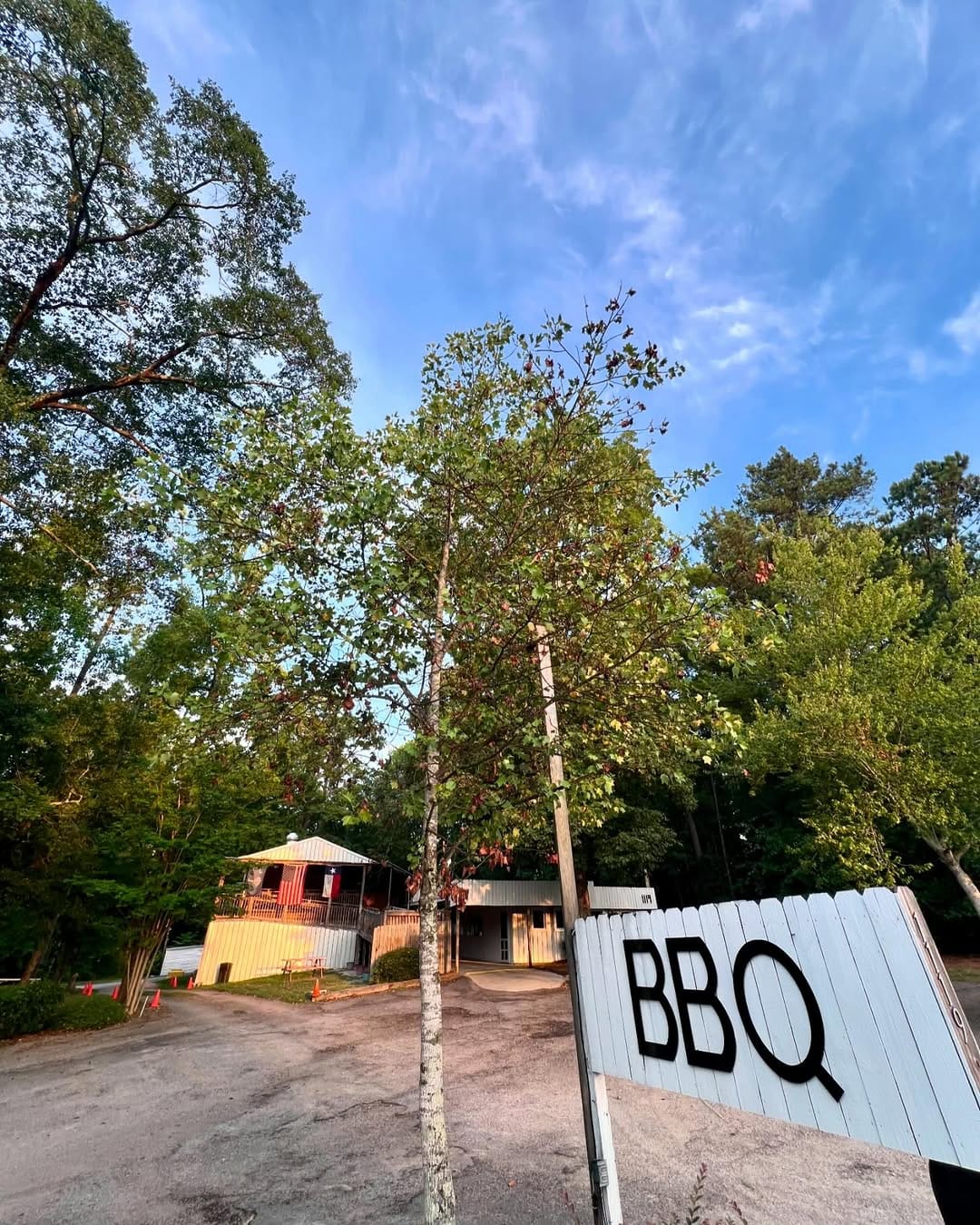
There are no level spots on the first floor. There ain't no damn level floors in this place. It's beyond crazy how it was built, but it works for us. And it's a vessel for me to express my barbecue vision.
The financial reality is if you've got a lot of overhead, you have to sell a whole hell of a lot of barbecue. If you're selling in volume, the way that you make money is by managing food costs, labor costs.
And for us that, that's not our ethos. That's not who we are. The food, it's either good or it's not. And if it's not good, it doesn't get served. And so we, the other part of our story is that we're, maxing out what we can do with the space and the equipment and the crew that I have.
And so, our opportunity for volume is just nine hours a week. Our opportunity for sales is just nine hours a week.
I guess I technically I do have the opportunity to increase my revenue, my top line revenue by opening more. But once I do that, my food quality and experience is going to suffer, because it's going to become far more challenging for me to make sure that it's as good as it needs to be.
Yeah, it'd be nice to have a really nice barbecue restaurant, but we don't want to spend the money on that when we got something good that works with this vessel that we have.
The Living South:
I mean, I think if it looks too much like an Applebee's or a Chili's or whatever, then people will expect kind of a bland, faceless sort of thing instead of what you're getting out there.
Robinson:
Yeah, and a funny story about our barbecue sign up front. Well to be honest, I didn't want to have any sign up front.
See that, that board marquee or whatever you want to describe it as, the prior restaurant had something on there. I took it off. So we actually operated for six months, eight months, 10 months, or a year with nothing out front, just a white painted blank board.
And I was on the other side of town and my brother messaged me, hey, I'm putting up the barbecue sign. I said, yo, hold on a minute, man, I'll be over there in a minute. So like I sped from the other side of town over there because I was freaked out. He took initiative because it was frustrating him because he knew that we were losing business, not much, but people had no idea that there was a barbecue restaurant.
If you're just driving by, you would just see a whole bunch of cars out front, like, what the hell is going on there?
And so I get over there and my concern was, is it going to look too nice because we got a raggedy, old-looking joint, and I don't want to have a nice sign out front.
But also, I'm trying to approach this very simplistically. Got over there, and he got 'BBQ,' and that's what's on the sign. And I was, man, I mean, these letters, it's really nice acrylic, it doesn't match, but I inadvertently broke one of the letters. The spacing is a little off, and once we got it up, I was like, OK, even though they're nice new letters, they're not put up right. One's broken, and it still kind of fits.
I have a very simple approach. I don't have almost no embellishment of the menu items or the corresponding description.
So when you look at my menu, it says collards or shells and cheese and the reality is that the collards, I spent a week curing bacon, then I spent two days smoking it, and then we also made a two-day pork stock using the pullings from the prior week, we braised the collard greens in with the bacon that we made, but on the menu, it's just collards.
If you want to know more about it, when you're at the counter, ask.
The Living South:
I can't speak for Texas, but, but here in North Carolina, BBQ's always sort of been a working person's kind of lunch or dinner. The people who were cooking whole hog in Eastern North Carolina, it's not like they were necessarily trying to make this groundbreaking, trendy thing so much as they didn't want to waste food.
Robinson:
So, this has been a hurdle to work through since day one. Early on I looked at my demographics, you know, who am I selling this to?
The Texas barbecue is inherently very expensive compared to, traditional Carolina barbecue and on top of that, I'm using a higher quality product than most other Texas barbecue joints outside of Texas. I'm using a no hormone, no antibiotic fancy brisket. It's like $1.52 more expensive. And I hate that, but I have to get price for it.
It's expensive, but I think it's worth it when you consider the time and effort and the methodology that went into it.
We're not fast food. We're not just trying to feed you. You can go to Arby's and get a brisket sandwich. That's not what we're trying to serve you. We're trying to serve you an authentically cooked piece of brisket, or beef rib, or handmade sausage. But on the other side of the house, the Carolina barbecue, it's almost a similar issue, but it's for a different reason.
All things equal with the local competitors or other barbecue joints. My pork barbecue sandwich, when you adjust it for similar weight, or similar portion size that goes onto the bun, I'm actually not the most expensive in the area of these old school barbecue joints.
I am very particular about our cooking technique and I can speak for myself. I know the proper way to cook shoulders and the bellies that we mix into our pork barbecue, and I know that when I serve it, it's going to be well-executed product, and my regular customers, they know that I have that level of care of what I do, and we shouldn't miss.
Maybe we miss every now and then, but we shouldn't miss, and so when you step up and you spend $14 for my barbecue sandwich, even though you could have gone to the other place and maybe had a $10 one, that $10 one weighs half as much.
If it's not breaking even, it's a better deal.
And so the challenge though is for the blue collar guy or blue collar woman that comes in, it is pricey. And so part of the way that I've attacked that is we have different menus Saturday and Sunday. Saturday that core barbecue menu, if you come in and get multiple proteins, it can get pricey really quick. But it's high-quality.
My Sunday menu is intentionally designed to have the opportunity for a blue collar type person to come in.
We still get blue collar customers, though, because those guys, it's mainly guys, those guys who come in, particularly the police and the fire department guys who come in, they know what they're getting, and they see the quality. I understand that and I don't say it out loud, but I am like, that's awesome when I see those guys online.
The Living South:
Up here in North Carolina, when you like one kind of barbecue, you kind of talk trash about the other one. I've always found them all to be delicious, even if I was Surprised by yellow sauce or by the Alabama's white sauce, something like that.
Robinson:
For the masses, there will always be what you grew up with eating is going to rule the day. And you really take me being out in Texas, I saw the stuff on the menu. Really, my eyes went directly to the pulled pork sandwich and I ordered it. I was like, holy crap, this is terrible. But that's what I was familiar with. I didn't want a Texas barbecue back then.
I saw an advertisement, a local advertisement last week where somebody was talking about they have three types of barbecue on the buffet. The reality is that they have the same barbecue with three different barbecue sauces. That is not three different types of barbecue.
What I've tried to do is define an in-between, And so, our Saturday pork, it's cooked Carolina style, if you will with a little bit more crafty approach because I'm cooking it technically correct, where I'm not overcooking it. We're saving a lot of the renders, a lot of that fat, and we're tossing it back in, but we're cooking what's called a long cut shoulder, which is the butt and the picnic, but also I'm cooking a belly.
When I look back at the really good whole hog trays that I've had, I had that bite of pork belly in it.
And so, what I've been able to figure out is we are cooking shoulders alongside bellies, directly over coals, salt only, and Saturday morning we are mixing those together to kind of create an in-between.
It's not whole hog and it's not pure butt, but it's in this magical space in between.
Where I'm at, I'm in pulled pork country, but I know that I've got a lot of people who are not from here, a lot of people from North Carolina who like chopped pork. And so when you step up to the counter. I give you the option, you want pulled pork or chopped pork, and so if you want chopped pork, we pull that portion of pulled pork out, we dump it onto the chop block right in front of you, and we chop the pork right there in front of you, and so you can have a legit different regional experience.
It costs me a little time. It costs me a little money with those containers, but you can have a legit pulled pork or legit chopped pork experience.
And then the third thing that I offered that is very unique in South Carolina is an homage to Skylight Inn and Sam Jones BBQ [in Ayden, NC]. I love that place.
I did Euphoria Greenville next to Sam Jones. My little setup was right beside him. And I'd never seen the whole skin chopped in thing. Ever. And before the event started. Sam gave me a tray with the skin chopped into it and it was one of these epiphanies or enlightening moments where I said, holy crap, that is phenomenal. That is delicious. Now, that got filed away in my brain and it took me a few years, but over the last year, year and a half, what I figured out is that shoulder and that belly that I'm cooking, Friday, those are skin on.
We figured out how to crisp the skin perfectly and consistently, and when you walk up to the counter Saturday morning or Saturday afternoon, if you want half a pound chopped with skin, we've got the skin, we've got the pork and we will chop it with skin right in front of you.
When we recommend that to somebody, they're like a lot of the people coming in, I've never even heard of that, that sounds good though, let me get that, and then some people are like, no, that's disgusting, I don't want skins chopped into my pork, that's fine, but those, more times than not, people will come back up to the counter and say thank you for recommending that. That was, that hand off to the side of the head, mind-blowing, like that is off the charts delicious.
I think that the Beard Awards are clearly recognizing the importance of barbecue in our food culture across the country, but mainly down in the Southern states.
I wouldn't be surprised if they create some sort of a pitmaster or barbecue category in the next few years.
The [pitmasters] that I know, I can assure you are guys who are not cutting the corners. And this is why I haven't done any Food Network shows yet, although I've had opportunities. I'm an expert in cooking food that takes two, four, six days to cook. I am not an expert in cooking food that takes 30 minutes to cook.
I think that the Beard awards are finally opening their eyes that the amount of work that we have to do for this is beyond stupid. I mean, like, literally, it's ridiculous.

